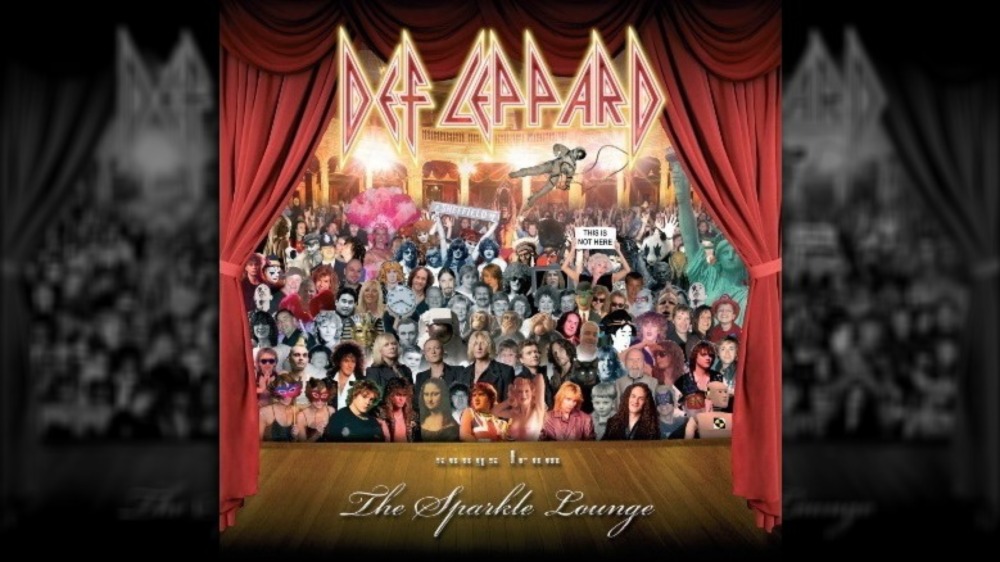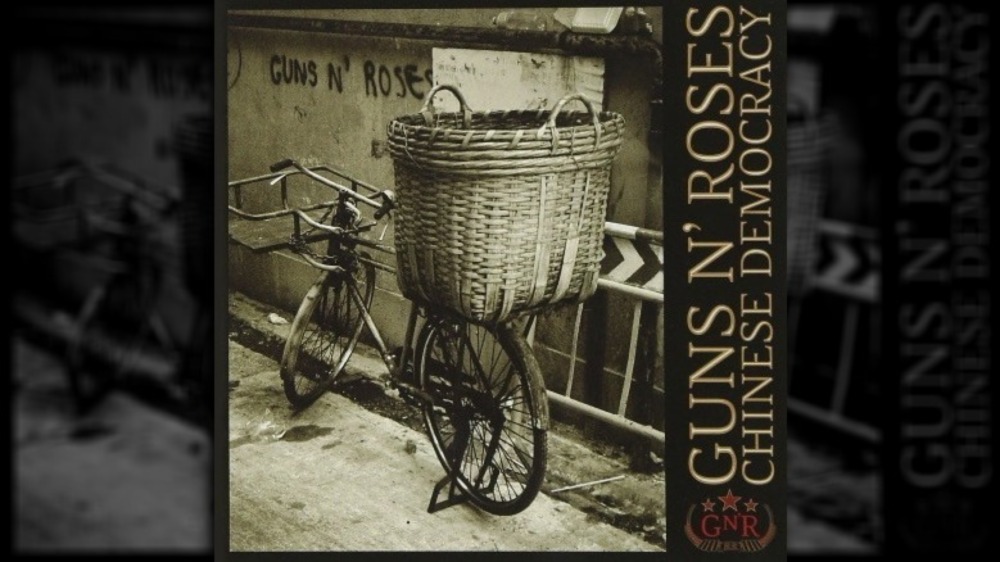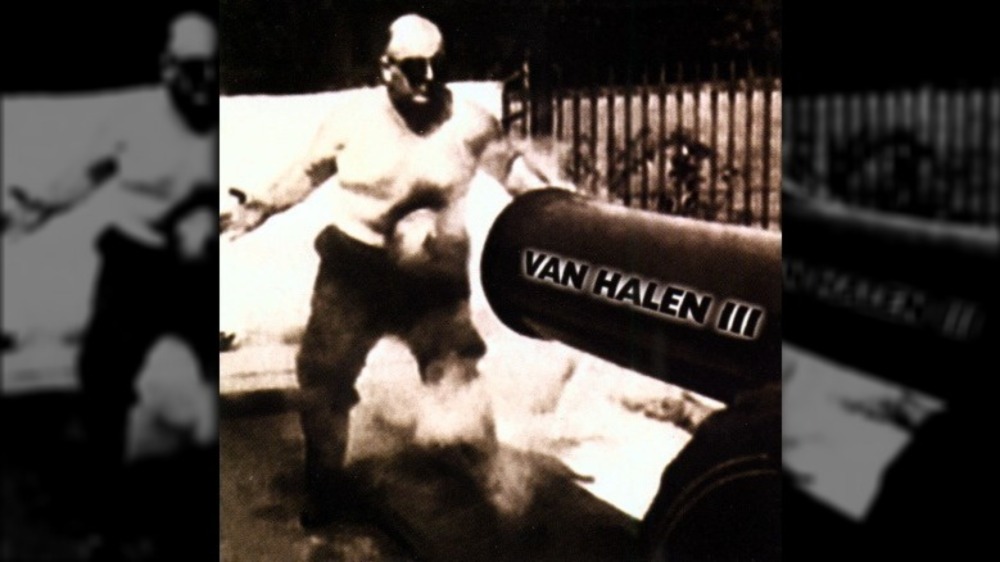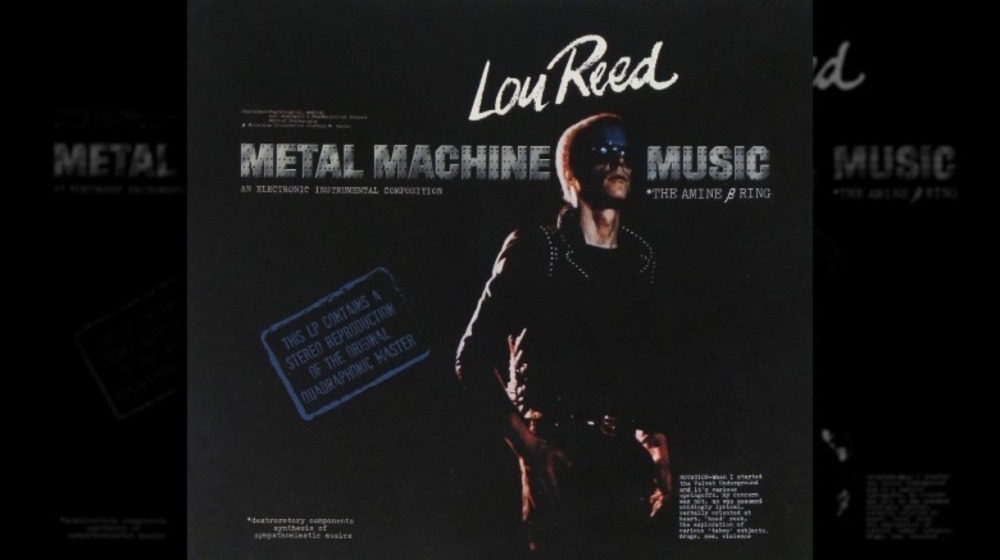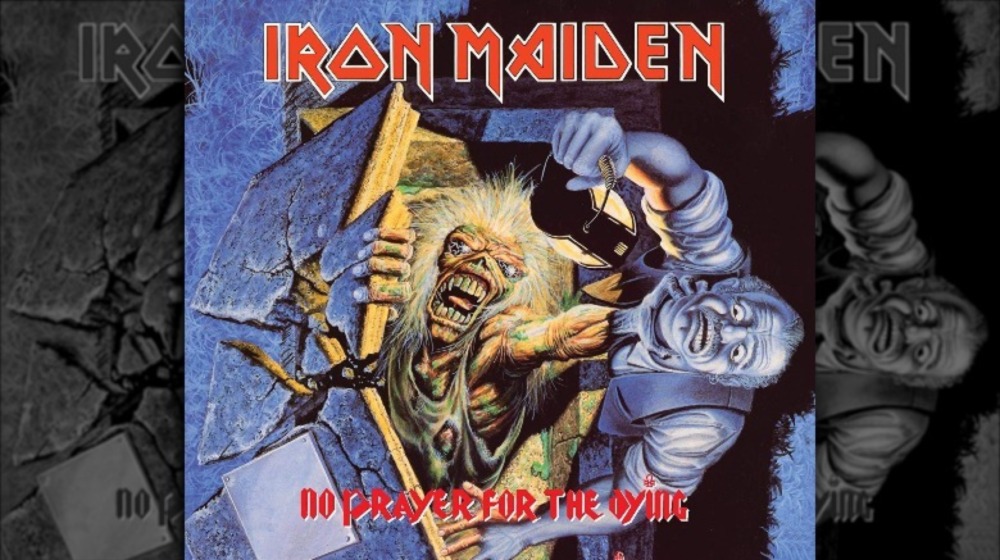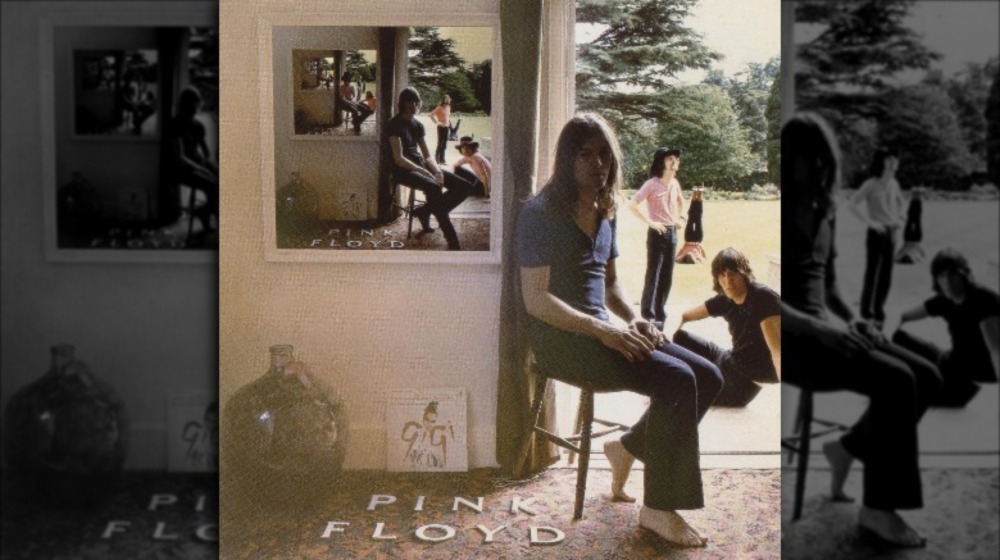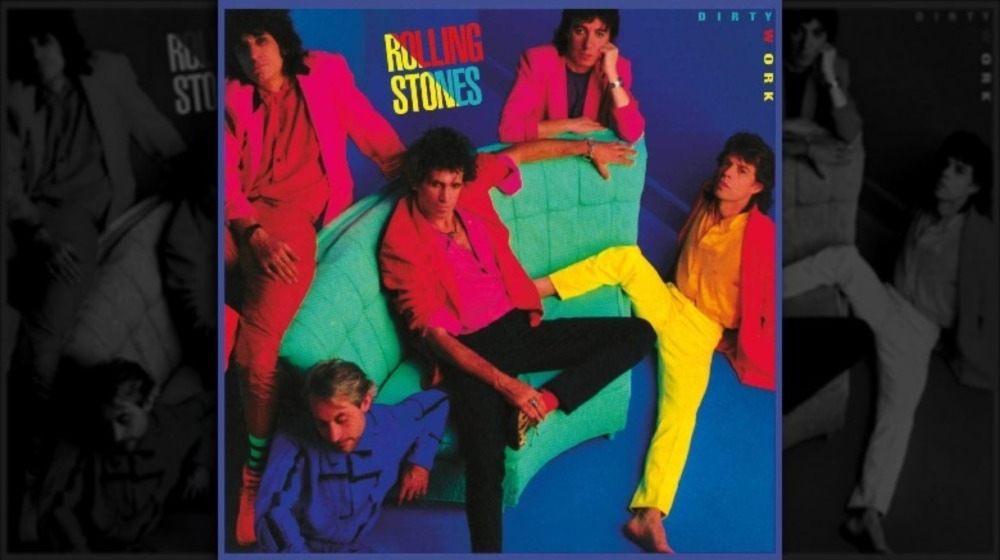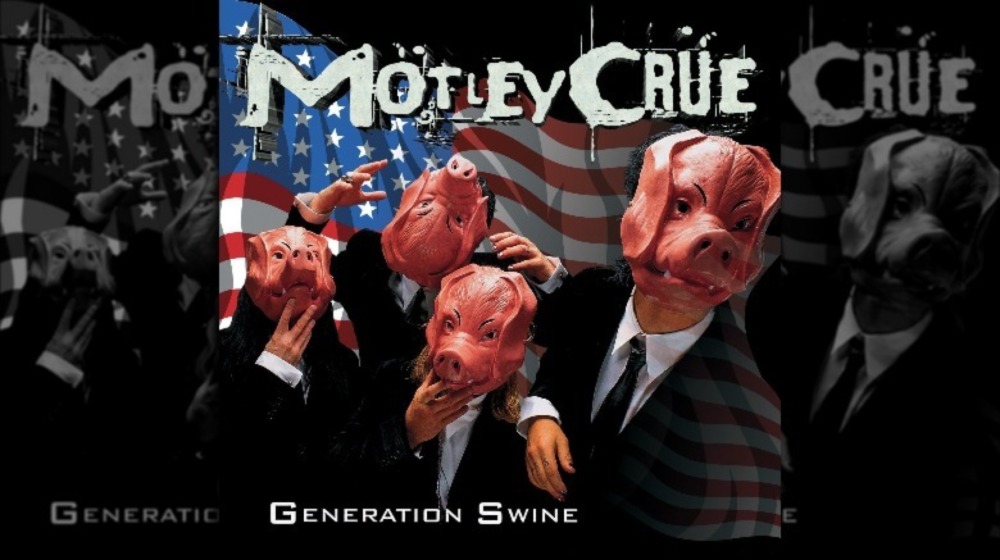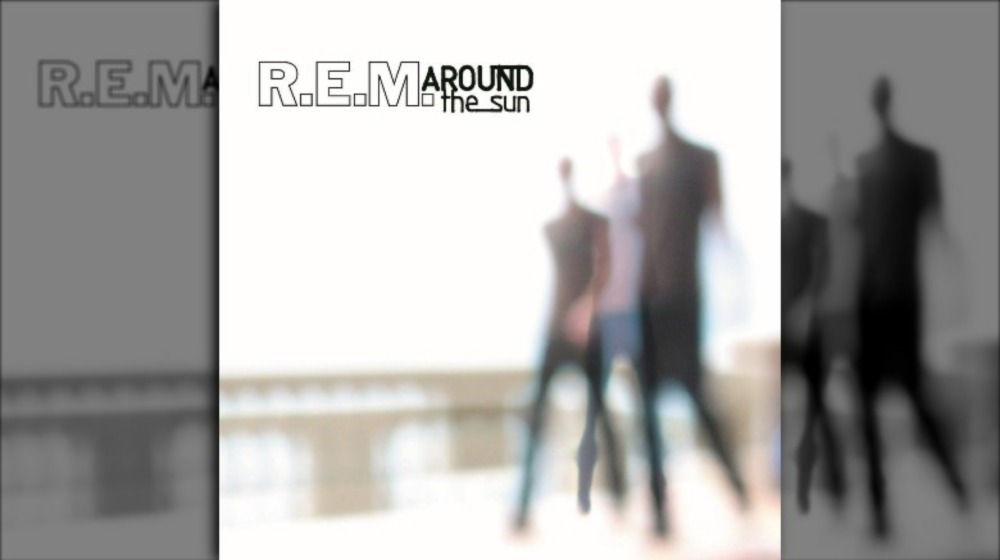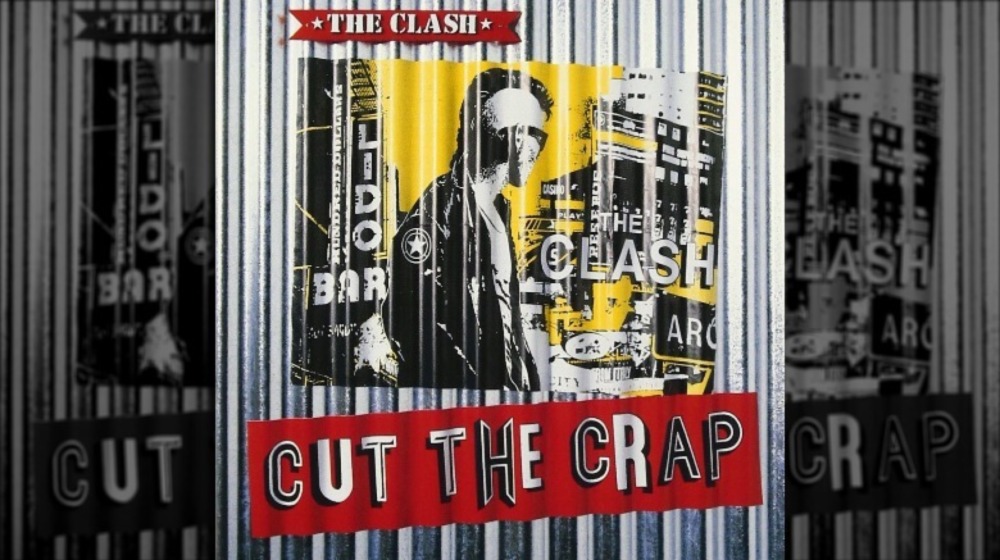The First Bad Album These Legendary Bands Released
The makings of a "legendary" band vary, but there are a few consistent features. They usually have a distinctive sound that influences future generations of musicians. They usually sell a large number of albums or downloads or whatever unit is shifting during their period of history. And their output is usually marked by consistently high-quality albums. Bands that only get their act together once in a while rarely attain "legendary" status.
Keeping up that level of quality isn't easy, and even the greatest bands in history have stumbled. The pressures of fame, constant touring, and trying to match past success while expanding your artistic horizons take a toll, after all. Eventually, every band releases an album everybody agrees is not only "not great" but downright bad.
And those bad albums are fascinating, because they come with stories — usually some pretty dramatic, gossip-drenched stories. Stories of infighting, substance abuse, self-indulgence, and desperate trend-chasing. While many of the following groups managed to course-correct after these disasters, it's still great fun to explore the reasons behind the first bad albums these legendary bands released.
Def Leppard, Songs from the Sparkle Lounge (2008)
Def Leppard emerged from the late 1970s as one of the most notable acts of the new wave of British heavy metal, and they hit the multi-platinum big time with 1983's Pyromania and 1987's Hysteria, the latter of which was a real triumph after drummer Rick Allen lost his arm in an automobile accident. After those high points, the band released a series of middling albums of varying quality, but they hit their first real low point with 2008's Songs from the Sparkle Lounge. Just the title tells you this is going to be a ride.
As Rolling Stone notes, after two albums (X and Yeah!) that were decidedly pop-oriented, the band sought to get back to their 1980s heyday on this album without the help of the producer who'd gotten them there in the first place, Robert "Mutt" Lange. The result can be charitably called a mess. The more straight-ahead rockers somehow have all the traits of a Def Leppard song — sweet, layered harmonies, hard rock riffs — but are poorly arranged and sound almost like a bad Def Leppard cover band.
But as Loudwire notes, it's the desperate moments on the album that take it from "mediocre" to "bad." Most notable is the collaboration with country superstar Tim McGraw on the song "Nine Lives." Country is a huge market, and lots of bands want a crossover hit to get on country radio, but this song is not only terrible — it's obviously a cynical ploy.
Guns N' Roses, Chinese Democracy (2008)
The story of this album is the stuff of legend: Guns N' Roses lead singer Axl Rose owned the rights to the band's name through a combination of trickery and manipulation, allowing him to record an album as GNR without a single other founding member of the band. He approached the project in classic Axl Rose style: Paranoid, drug-fueled, and with a level of perfectionism beyond mere mortals.
Holed up with a pile of drugs for more than a decade, he tinkered endlessly with his songs, spent mounds of his record label's money ($13 million, according to Rolling Stone – for reference, Led Zeppelin I cost about $3,500 to record), and finally released what can charitably be called a hot mess of a record.
To say Chinese Democracy is self-indulgent is like calling the Sun bright. As Slate puts it, the album mixes "hard rock with other stuff: pop-metal, boogie-blues, Queen-inspired glam, schmaltzy piano pop in the Elton John mode. [...] By the sound of it, Rose simply dumped every musical idea he'd ever had, every genre he'd ever heard, into his Pro Tools. And stirred."
Rose famously recorded with dozens of musicians and then combined different performances in the mixing process as he sought a specific sound. The result is not good. As Loudwire points out, the songs on the album "sounded exactly like what they were — stitched together song fragments from over the years, united under a lackluster and tepid mix."
Van Halen, Van Halen III (1998)
Sometimes a bad album absolutely destroys a band, and that's the case with Van Halen III. Their first (and only) release with singer Gary Cherone after their acrimonious split with Sammy Hagar, the title of the album is supposed to be a link back to their classic debut and follow-up, 1978's Van Halen and 1979's Van Halen II. They fell just a little short of that goal.
Cherone was an eyebrow-raising choice from the beginning — a decent enough singer and frontman who'd enjoyed chart success with his band Extreme but a poor match to Eddie Van Halen's musical style and personality. The album is, in a word, terrible. As Loudwire puts it, the songs are "different variations of awful," and the band makes halfhearted stabs at grunge and other trends that were already fading when the album was released (1998). Ultimate Classic Rock argues that one big problem is that Cherone is forced "to do a Sammy Hagar impression" instead of doing his own thing, which might have at least salvaged something from this mess.
The album essentially killed Van Halen — they didn't release another for 14 years, and it required reuniting with original lead singer David Lee Roth to make it happen.
Genesis, From Genesis to Revelation (1969)
It's quite an achievement to have your first bad album be, well, your first album. Most bands that release something as uniquely terrible as From Genesis to Revelation have the self-respect to break up and start over. But not Genesis.
As Rolling Stone writes, the members of Genesis were still in school when they were recruited by an alumnus named Jonathan King to record an album. King named them Genesis and ordered them to write songs based on the Bible. The group did their best, writing songs that mimicked the sound of the Bee Gees (the 1960s version, not the disco-dancing 1970s Bee Gees). Then King added tons of string arrangements to every song. The band is frank about being totally embarrassed about it — keyboard player Tony Banks calls the album "absolutely pathetic." To make matters worse, most record stores assumed it was religious in nature and filed it in that section, so it sold something approaching zero copies.
As Stereogum points out in its review of the album, much of the problem is the band's lack of experience, though it sees some flashes of the genius that was to come — and the band recovered to become prog rock legends.
Lou Reed, Metal Machine Music (1975)
There are some who have come around on this legendarily terrible album, and some modern-day critics have tried to argue that it's actually great. But all it takes is one listen to confirm that, no, really — it's awful. Rolling Stone describes it as "four sides of what sounds like the tubular groaning of a galactic refrigerator," and that's one of the nicer things critics have said about it.
Metal Machine Music doesn't have songs, really; it's a double album of noise, guitar feedback, and sound effects. And what's truly amazing about it is that to this day, no one is sure if Reed released it as a joke, a statement on the music industry, or because he actually thought it was great stuff. As Ultimate Classic Rock notes, the most popular theory on why Reed released this "abrasive, confrontational, controversial and difficult" album that "didn't sound ahead of its time in 1975, and it sure doesn't sound ahead of its time now" is that he was being provocative: He simply wanted to show his contempt for everyone who was not Lou Reed.
Lou Reed was a terrific songwriter who's given us some incredible compositions. But no other Reed album — possibly no other album, period — is so devoid of anything you'd want to hear a second time.
Iron Maiden, No Prayer for the Dying (1990)
Iron Maiden have been around since 1975 and have released 16 studio albums — and 13 live albums, which is a testament to how awesome they are in concert. The band has always been ambitious, and its first seven albums are each more complex and intricate than the last, culminating in 1987's Seventh Son of a Seventh Son. Artistically, that album is well-regarded, but at the time, the poppier sound made fans a bit restless.
For its eighth album, the band decided to try a "back-to-basics" approach. As Loudwire notes, this didn't sit well with longtime guitarist Adrian Smith, so he quit after halfheartedly co-writing one song. The loss of Smith's innovative guitar playing doomed the album from the start, and the result was a release that Ultimate Classic Rock says "managed to grow instantly dull and stale." The songs are uninspired retreads, and without Smith's ability to elevate mediocre songs with incredible guitar work, the lack of ideas was obvious. Worse, the band chose to record at Barnyard Studios in Essex, England, owned by bassist Steve Harris — which is literally a barn. As a result, the record sounds muddy and rough, as opposed to the pristine clarity fans had come to expect
The album kicked off a long decline. Lead singer Bruce Dickinson left, and Iron Maiden put out several uninspiring albums until they reunited with him and experienced a renaissance in the 2000s.
Pink Floyd, Ummagumma (1969)
Pink Floyd was formed by Syd Barrett, Nick Mason, Roger Waters, and Richard Wright in 1965, and Barrett was the driving creative force in their early years. Barrett's mental condition grew increasingly dire, however, and by 1968, he'd left the band, never to return. As Ultimate Classic Rock points out, it took Pink Floyd several years to figure out how to be a band without him, and unfortunately, during this time, they released the album-like thing called Ummagumma.
While Roger Waters would begin to exert increasing creative control over the group, when they began work on their fourth studio album in 1969, he hadn't yet taken on a leadership role. The band's solution was to put out a double album, with one side devoted to live tracks and one side where each remaining member would basically contribute a solo song. As a result, there's no cohesion because this really isn't a band, and percussionist Mason and keyboardist Wright really had no business writing and arranging songs by themselves. As Paste Magazine puts it in their review, Ummagumma "is Pink Floyd at their most bloated [...] they mistake aimlessness for import, in the process creating a towering monument to rock self-indulgence."
In fact, guitarist David Gilmour flat-out admitted that he spent very little time on his own contributions — and it shows. A lot. To be fair, the live side is well-regarded, but mainly for its technical aspects.
The Rolling Stones, Dirty Work (1986)
The Rolling Stones had an uneven 1970s, kicking off the decade with several classic albums but then losing their way. But just when people were beginning to write them off as has-beens, they raided their backlog of old songs and sailed into the 1980s with Tattoo You, which reinvigorated their fans.
That album is great — but it was mainly older material freshened up and re-recorded. The band couldn't effectively build on that success, however, because they weren't working well together (especially primary songwriters Keith Richards and Mick Jagger) and couldn't agree on a direction — Richards wanted to lean into their blues roots, while Jagger wanted to go modern and pop. They released one mediocre compromise record, 1983's Undercover, and then the infighting produced the first true stinker in their career: Dirty Work.
Ultimate Classic Rock lays out what's wrong with the album: "Too slickly produced, too detached, uttering lacking danger [...] it pointed to every bad idea that would plague the Rolling Stones as they moved forward." As Treblezine points out, Mick Jagger was working on solo albums at the time and was so disinterested in Dirty Work that he often skipped recording sessions entirely — and it shows. They graft on 1980s production trends to try to give it a modern sheen, but this just undermines the grit and bluesy growl that makes the Stones the Stones. And the less said about their cover of "Harlem Shuffle," the better.
Mötley Crüe, Generation Swine (1997)
Say what you will about glam rockers Mötley Crüe, but they delivered some great riff-centric hard rock in the 1980s. The five albums they released in that decade – Too Fast for Love, Shout at the Devil, Theatre of Pain, Girls, Girls, Girls, and Dr. Feelgood – aren't exactly subtle and complex, but they rocked and left an impression.
1989's Dr. Feelgood was their most successful album to date, and the band felt some pressure to match its success. That pressure broke them: Just a few weeks into recording sessions for the next album, lead singer Vince Neil quit. The band managed to salvage the situation — they hired a new singer (John Corabi) and put out 1994's Mötley Crüe. It's not a great album, but it's pretty decent and went Gold.
Working on the next album is when things really went sideways. As Loudwire reports, the infighting got so bad that Corabi followed in Neil's footsteps and quit. The band thought they were geniuses when they convinced Neil to return to the fold, but the songs they'd already written had been composed for Corabi's very different voice, and Neil couldn't quite make it work — he sounds awful.
As Metal Forces Magazine notes in its review, the band also tried to chase the grunge and industrial trends of the time, with disastrous results. The album destroyed Mötley Crüe — it was 13 years before they attempted a comeback.
R.E.M., Around The Sun (2004)
After a grueling, exhausting world tour — they recorded their 1996 album New Adventures in Hi-Fi during sound checks and downtime, making the tour even more exhausting and grueling — drummer and founding member Bill Berry left R.E.M. It was an amicable departure, and any concern that the band wouldn't know how to proceed without Berry was put to rest when they released Up in 1998. Up isn't a classic, but it's a very good album and was well-received. 2001's Reveal was similarly good-but-not-great.
Then the bottom dropped out with the atrocity that is 2004's Around the Sun. As Treblezine puts it, "everything that once made this band great — intricate and historically detailed lyrics, unshakable melodies, sparkling guitar riffs, energy — are pretty much all missing in action." The album just sounds tired, an album you forget the minute it ends. It's clearly a band at the end of its creative rope.
As Yardbarker points out, that malaise extends to the production. The jangly guitar sound that had defined R.E.M. was replaced by synthesizers, and the songs sound weak and tinny, resulting in "the dullest record of [R.E.M.'s] career." The good news is that the band realized how bad this album was and rebounded with two pretty good releases before they folded their tent in 2011.
The Clash, Cut the Crap (1985)
Few bands have managed to burn down their own reputation the way The Clash did in the early to mid-1980s. After establishing themselves as arguably the most important and influential punk band in history in the late 1970s, the group released the confusing, experimental Sandinista! in 1980 and the glossy, pop-oriented Combat Rock in 1982.
Then the feud between co-founders Mick Jones and Joe Strummer came to a head, and Strummer fired him and drummer Topper Headon. As Louder notes, Strummer was in a very bad place mentally and emotionally at the time, and the band's manager Bernie Rhodes took advantage of the situation to seize control of the recording sessions. He brought in drum machines and loops and synth-horns that didn't match up well with the punk core of Strummer's songwriting. Realizing that he needed the melodic sense that Jones had brought to the band, Strummer begged him to come back, but Jones refused.
Cut the Crap is, in a word, terrible. As Ultimate Classic Rock notes, it probably shouldn't be considered a Clash album at all but rather a Joe Strummer solo album, and Joe Strummer was, at this point, a drugged-out mess. These days, the official band website more or less pretends the album doesn't exist, and no one blames them.
U2, No Line On The Horizon (2009)
It might seem ludicrous to say that an album that debuted at #1 in 30 countries and sold millions of copies is bad, but facts are facts: No Line on the Horizon is a very bad album.
By 2009, U2 were no longer the creative force they'd once been. Where they'd once made a living taking real chances and reinventing themselves with each album, trusting their fan base to follow, they'd been releasing perfectly boring, professionally assembled songs for years — but this album is a real nadir. As Pitchfork notes, it was supposed to be a return to form — the band made a big deal about working with a new producer (Rick Rubin, who soon left the project) and shaking things up — but it wound up a release that is "a defensive gesture, and a rather pitiful one at that."
No Line on the Horizon is messy and uninspired, despite the presence of old-time collaborator Brian Eno. The songs feel incomplete and unfocused – The Irish Times calls it "bloated and insubstantial" — and the album proves that the band probably should have retired after 2004's How to Dismantle an Atomic Bomb.

